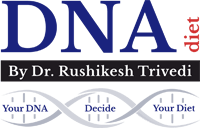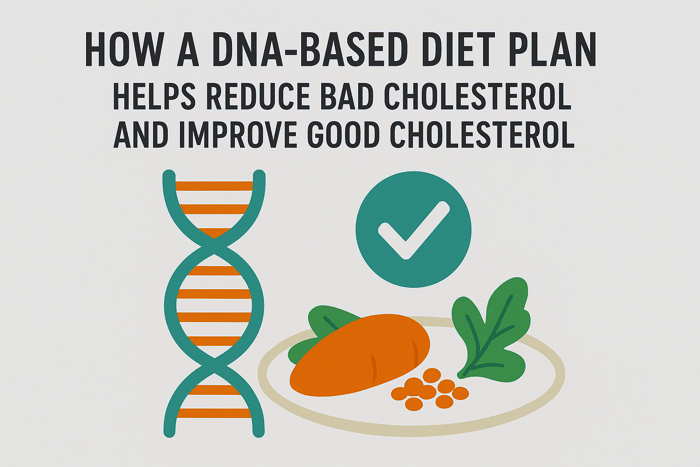How a DNA-Based Diet Plan Helps Reduce Bad Cholesterol and Improve Good Cholesterol
Cholesterol is often misunderstood. While it is essential for building cells and hormones, imbalances can lead to serious health issues like heart disease and stroke. The two main types of cholesterol — LDL (low-density lipoprotein) and HDL (high-density lipoprotein) — play opposing roles. LDL is often termed “bad cholesterol” because high levels can lead to plaque buildup in arteries. HDL is known as “good cholesterol” as it helps remove LDL from the bloodstream.
For decades, diet and exercise have been the go-to recommendations for managing cholesterol. But not everyone responds the same way to the same diet. Why? The answer lies in your genes.
This is where DNA-based diet plans are changing the game.
The Genetic Connection to Cholesterol
Cholesterol metabolism is heavily influenced by genetics. Your DNA determines:
- How your body absorbs fat and cholesterol
- How efficiently your liver processes and removes LDL cholesterol
- How you respond to certain types of fats and dietary components
Some people have a genetic tendency to absorb more cholesterol from food. Others may have a variation that makes their liver less efficient at clearing cholesterol from the blood. This is why two people can eat the same foods, but have very different cholesterol levels.
By analyzing your genetic profile, a DNA-based diet plan identifies which dietary changes will work best for your unique body.
How a DNA-Based Diet Helps Lower LDL (Bad) Cholesterol
- Targeted Fat Intake
- Generic diets may tell you to reduce fat overall, but a DNA-based plan can tell you exactly which fats to cut. For example, some people respond poorly to saturated fats found in butter and red meat, while others may not experience much impact.
- Your genes may also reveal whether monounsaturated fats (like those in olive oil and nuts) or polyunsaturated fats (like those in fish and flaxseed) are more beneficial for your heart.
- Carbohydrate Sensitivity
- Some people have a genetic sensitivity to carbohydrates, especially refined ones. In these individuals, high-carb diets can raise triglycerides and lower HDL, indirectly raising LDL risk.
- A DNA-based diet would recommend a lower-carb or complex-carb-focused diet for these individuals to stabilize cholesterol and insulin levels.
- Fiber Metabolism
- Fiber binds to cholesterol in the digestive system and helps flush it out. But some people genetically process fiber more effectively than others.
- Your DNA may suggest whether you should focus more on soluble fiber (like oats, barley, and legumes) or insoluble fiber (like wheat bran and vegetables) for maximum cholesterol-lowering benefits.
- Nutrient Utilization
- Nutrients like niacin, plant sterols, and omega-3 fatty acids are known to improve cholesterol profiles. Your genetic makeup can reveal how efficiently your body absorbs and uses these nutrients.
- A personalized diet plan would guide you to food sources or supplements that your body is more likely to respond to.
How a DNA-Based Diet Boosts HDL (Good) Cholesterol
- Right Fat Ratios
- While cutting out unhealthy fats, DNA-based diets often encourage foods rich in HDL-boosting fats, such as fatty fish (rich in omega-3s), nuts, and avocados, based on your fat metabolism genes.
- Exercise Recommendations
- Some people have a genetic variation that makes them respond better to aerobic exercises for raising HDL. Others may benefit more from strength training or a mix of both. DNA testing can fine-tune your workout plan accordingly.
- Alcohol Metabolism
- Moderate alcohol intake (especially red wine) is known to raise HDL in some individuals. But your genes may indicate poor alcohol metabolism, making this strategy harmful instead of helpful. A DNA-based approach removes this guesswork.
The Big Advantage: Precision Over Guesswork
The biggest strength of a DNA-based diet is precision. Instead of following general cholesterol advice, you follow recommendations built for your body. That means:
- No more cutting out foods that aren’t harming you
- No more eating “healthy” foods that don’t help you
- Faster and more sustainable cholesterol control
Final Thoughts
Managing cholesterol is not about eating less, it’s about eating right — and what’s “right” can vary dramatically from person to person. A DNA-based diet plan helps identify your body’s natural tendencies, guiding you toward dietary choices that are scientifically aligned with your genetics.
So if you’ve tried generic diets and still struggle with high LDL or low HDL, it’s time to look within — at your DNA.
Book your free consultation today and take the first step toward a truly personalized approach to better heart health.
📞 099133 30931


